#mike duncan
Text
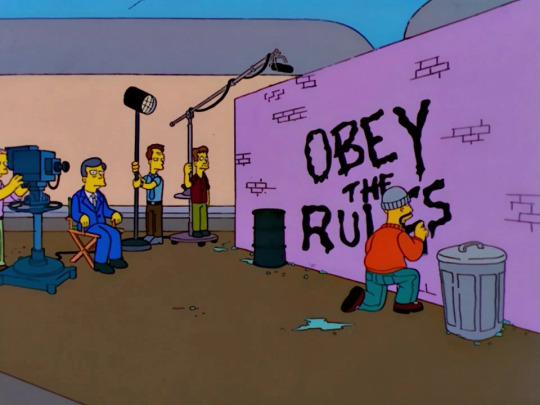
Mike Duncan of the revolutions podcast: I've been writing some punk rock songs about the French Revolution.
Mike Duncan: So if you want to see us live, get vaccinated -
Me:
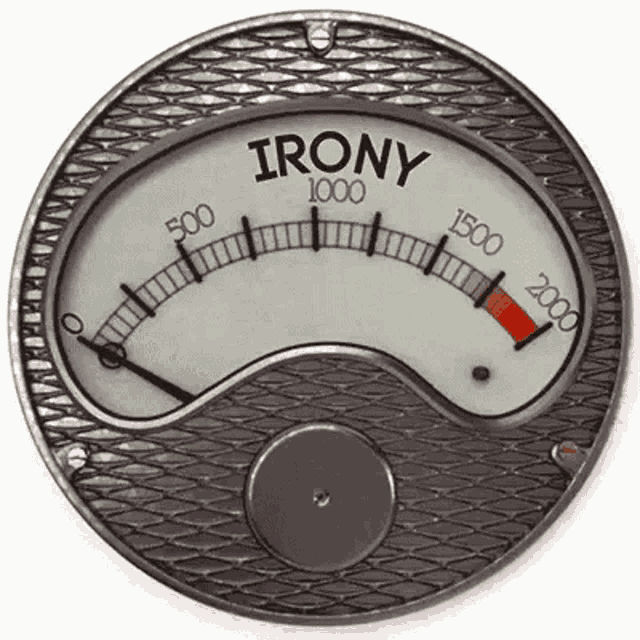
Imagine telling people to take a government sponsored, endorsed, and protected vaccine, so the government will loosen restrictions, so you can have a punk rock show.
(For extra irony he said this in August 2021, and he said there was a chance the performance would get cancelled, even if it was pushed back to spring 2022.
This has exactly the same vibe as antifa supporting the Canadian government against the trucker protests. They were literally siding with the government trying to force workers to comply for the greater good, and calling the workers who didn't want to do what the state said fascists.
27 notes
·
View notes
Text
[After wrapping up the Revolutions Podcast, Mike Duncan revisited Episode 0 (the Introduction), to see what he got right, what he got wrong etc. And 9 years later, he highlighted one phrase, and reconsidered.]
“...with the show covering a series of distinct time periods that are thematically linked but otherwise wildly disconnected....”
“I no longer believe that. It’s one of the most consequential changes in my historical worldview, from when I started the show in 2013 to where I am now, here at the end of 2022. Now, I knew going into the podcast that there were obviously gonna be links between like the American Revolution and the French Revolution, similar ideas and other connections, crossover characters like Lafayette and Thomas Paine. But once I hit the French Revolution, I realised deep deep in my bones how much I was NOT talking about “distinct time periods that were wildly disconnected”. Quite the opposite. I found everything deeply interconnected and meshed and interrelated. I basically lost all faith in discrete national histories being able to even remotely answer the basic historical question, “what happened”.
It probably started when I realised that there was no way to explain the French Revolution without explaining the Polish Partitions, but then, as I advanced into Haiti and Spanish America, I became fully consumed by the idea that this whole time I’ve just been describing one single revolutionary event playing out in different theatres. That there isn’t an American Revolution and a French Revolution and a Haitian Revolution, but one single Atlantic Revolution. I simply do not believe that things are wildly disconnected any more. I have a fundamentally holistic understanding of history now. But then, advancing though the years as we moved to 1848 and the Paris Commune and Mexico and Russia, the histories and personalities and ideas, they grew, they developed, they shifted and transformed, but there was never a break in continuity.
Everything is connected to everything else. There are no histories. There is only History, one single thing, that never ends.”
— Mike Duncan, Revolutions Podcast | Appendix 1: “Coming Full Circle”
@we-arerevolutionary
317 notes
·
View notes
Note
Have you read Mike Duncan's Hero of Two Worlds? if you did, do you recommend it?
Thank you!
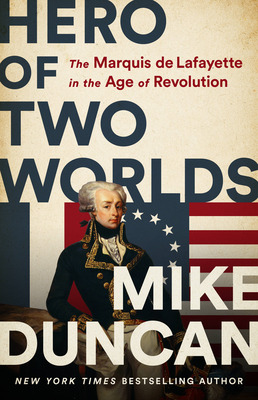
Dear Anon,
yes, I did read Mike Duncan’s Hero of Two Worlds and although it has been a few years, I knew that I was quite exited when the book was first released. I am not a Podcast-person, but I had been told that Duncan is quite an excellent history podcaster, and his book was a more recent publication then some other works out there. Duncan covers La Fayette’s life from cradle to grave with a marked focus on the American and French Revolution – as was expected. His writing style is very comprehensible and although the book is around 500-ish pages, it still was an easy and fast read.
As to recommending it, that depends a bit on what you are looking for in a book about La Fayette. As a general overview about the Marquis’ life, I can recommend the book. Harlow Giles Unger’s Lafayette is often cited as the best general biography but while Unger’s book is maybe a tad more detailed, I prefer Duncan’s handling of source material. There were a few little things that made me pause while reading but these were mostly differentiating interpretations.
As I said, it is a very general biography that covers La Fayette’s whole life in one book. If you are looking for an insight into a specific aspect of La Fayette’s life or a very detailed analyzes of his every move, Duncan’s book understandably falls flat.
I remember that I liked the book when reading it, but I was not blown out of the water. There was nothing one had not heard of before and by that time I had read enough about La Fayette to not be surprised by the book. But Duncan proofed that he understood the core of La Fayette’s character.
In short, Hero of Two Worlds is a fine book – especially if you are trying to get an overview of La Fayette’s life and this is maybe one of your first books about him.
I hope that helped and I hope you have/had a wonderful day. Happy reading! :-)
#ask me anything#anon#history#french history#american history#american revolution#french revolution#marquis de lafayette#la fayette#mike duncan#hero of two worlds#books#harlow giles unger#lafayette
44 notes
·
View notes
Text
Kind of re-listening to the Revolutions series on 1848 at background noise and, like, Metternich has to be pretty much the closest history has come to producing the whole 'arch-ideologue philosopher king of the Empire engineering all this shit out of actual principle and not self-interest' archetype I was complaining about a bit back.
'foremost defender of royal absolutism on the continent continually stymied by how useless and incompetent the emperor whose absolute rule he serves is' is admittedly a pretty funny bit, though.
61 notes
·
View notes
Text
Today's book review: The Storm Before the Storm, by Mike Duncan!
I've liked Duncan's work for a long time. He's exceptionally good at making complex subjects easy to follow, and he's considerably better than Tom Holland, Michael Parenti and most "pop historians." His podcast, The History of Rome, is still one of the best bird's-eye views of the period from 753 BCE to 476 CE. Yep. It is LONG.
Anyway, The Storm Before the Storm runs from the end of the Punic Wars in 146 BCE, through the wars of Jugurtha, the socii, Marius and Sulla, to Sulla's death in 78. The goal of this book is to explore how the Roman republic became so damaged that men like Caesar and Pompey were able to break it apart. It also serves a valuable place as one of the few mainstream books covering this time period.
I do think this is a good introduction to the Gracchi, Marius, Sulla and the struggles of their generation. Duncan makes the events exciting without over-dramatizing them, and although he expresses horror and dismay as civil war erupts, he's good at not taking sides with any particular faction. Most of his claims come directly from classical sources he's read.
That said, he's less acquainted with recent scholarship, so some of his claims are outdated. He repeats the "agrarian hypothesis" which is now discredited - that is, the idea that large slave plantations exacerbated the divide between rich and poor, and displaced many families to the city where they destabilized Roman politics. He also repeats the old ideas of Gaius Marius being chiefly responsible for the Marian reforms, which in turn made armies more loyal to their generals than to the government. In reality, those reforms were much more small-scale, and did not fundamentally change the incentives or culture of army life. (For a thorough analysis, see Gruen's Last Generation of the Roman Republic, chapter 9.)
There is also the question of whether the Roman republic was "on the road to ruin" by Cicero and Caesar's era, a view that Duncan shares with most popular history. But Gruen (LGRR), Morstein-Marx (Julius Caesar and the Roman People) and others have made comprehensive arguments to the contrary: that it was not the decline of the republic that caused the civil war of 49, but the civil wars of 49-30 that caused the demise of the republic. Personally, I lean more toward that view, but there's no consensus.
In short, I think Duncan's work is very good for learning the concrete events of this time period, and how the classical sources portrayed these events. But be cautious of his analyses for the bigger picture, and look at more academic sources, too.
#jlrrt reads#mike duncan#the storm before the storm#book review#book rec#marius and sulla#the social war#roman history
18 notes
·
View notes
Text
I've been listening to the first season of Revolutions, on the English Civil War, and it's striking how often events follow the pattern 'this battle/meeting/parliament could have ended the civil war, except that some aristo did something so mind-numbingly stupid even by the standards of contemporary observers that it actually kicked off a whole additional war.' Many such cases in British history, broadly.
Also somewhat shocking how ahead of their time the Levellers in the New Modern Army were - proposing a package of reforms to suffrage, religious freedom, the legal system etc, in the mid 17th century that would still be radical during the Age of Revolutions nearly 150 years later.
5 notes
·
View notes
Text
After years of Greek, Roman and Byzantine histories, both in Podcast and Books, I took a step forward in time to Mike Duncan’s Revolutions podcast.
After 6 months of listening to the English, American, French, Spanish ReConquista of South America, Haitian and Mexican Revolutions, I have popped out bleary eyed and squinting into the 20th century’s 1920s.
I still have the Russian Revolution to go (and a few odd Cold War books) but I find myself missing the Ancient World.
#podcasts#mike duncan#revolutions podcast#mexican revolution#history#ancient history#rome#the french revolution was wild#i’ll be giving that another listen#english revolution#oliver cromwell#haitian revolution#voodoo#colombian revolution#simon bolivar#russian revolution#trade unionist#join a union#the worker#even in the 21st century#gig workers#the working class#there is no war other than class war#the dignity of basic human rights
2 notes
·
View notes
Text
Books I Read in May
(Because I’m trying to get back on this wagon after missing April.)
18. The Emperor of All Maladies: A Biography of Cancer by Siddhartha Mukherjee

This is probably not my favourite piece of pop science writing, but it’s really got to be up there. The history of how cancer’s been understood and treated through the last century is just absolutely morbidly fascinating (my roommate has placed a moratorium on any unsolicited ‘fun facts’ since I started reading this book).
But beyond a) an incredibly visceral understanding of what Leukemia is and b) an appreciation for the public health advances of the early/mid-20th century, my main takeaway was that the book was actually just weirdly hopeful? Like, compared to, well, everything (except consumer electronics) the degree to which cancer treatment’s have actually just kept getting better over the last decades gives you back a bit of the old faith in Progress.
Also just both very readable and downright poetic at points (and just. Incredible title.)
19. Light From Uncommon Stars by Ryka Aoki
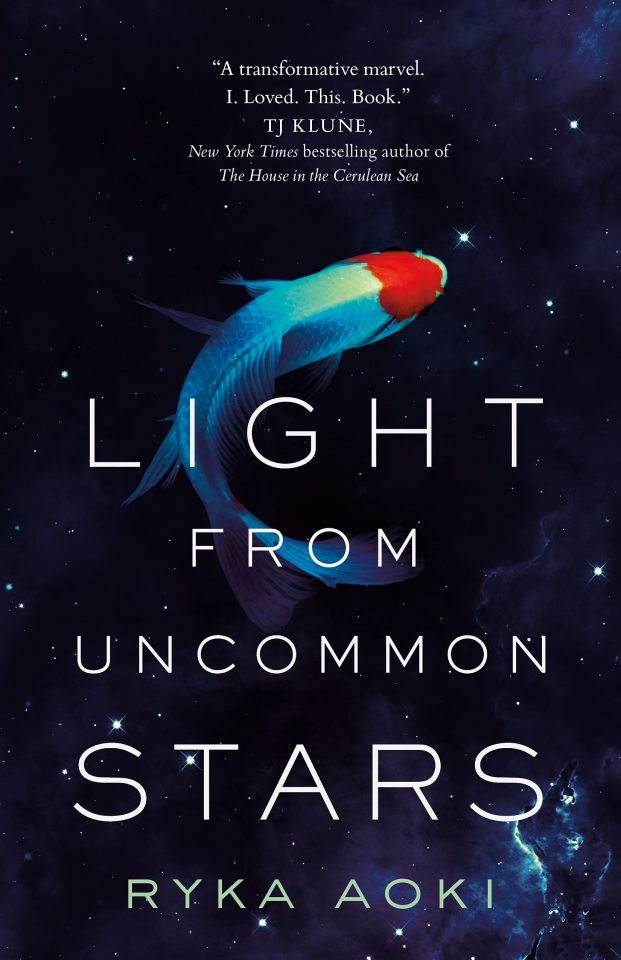
Hugo nominee novel number 2!
I was, honestly, not particularly impressed. Like it’s not bad – really extremely readable, really – but just, eh? 6/10.
It was above all just so very sentimental – believe in yourself! Love conquers all! Happy endings for absolutely everyone! Good bread tastes like home, even if you’re an alien! - which I suppose I’m just allergic to, and so will restrain myself about because it’s just a matter of taste.
Katrina was a good protagonist, entertaining internal monologue, well executed if incredibly predictable arc. But Shizuka and Lan...for the sheer amount of the book their romance took up, it still felt like the romance subplot thrown in as an afterthought in some blockbuster? They fell in love at first sight because the story tells us they do, and then they spend a bunch of scenes together, so clearly they’re a love for the ages! Never mind the palpable lack of chemistry or real connection between them. (And the less said about the rest of Lan’s family the better, character-wise. Though I mean Shirley was just an embodied cliche but it’s a cliche I like so she gets half-credit).
And yeah I could bitch about this book for ages but that just seems meanspirited (also I already spent like two hours doing so with @toasthaste) so. The evil violin repairwoman was fun?
20. She Who Became The Sun by Shelley Parker-Chan
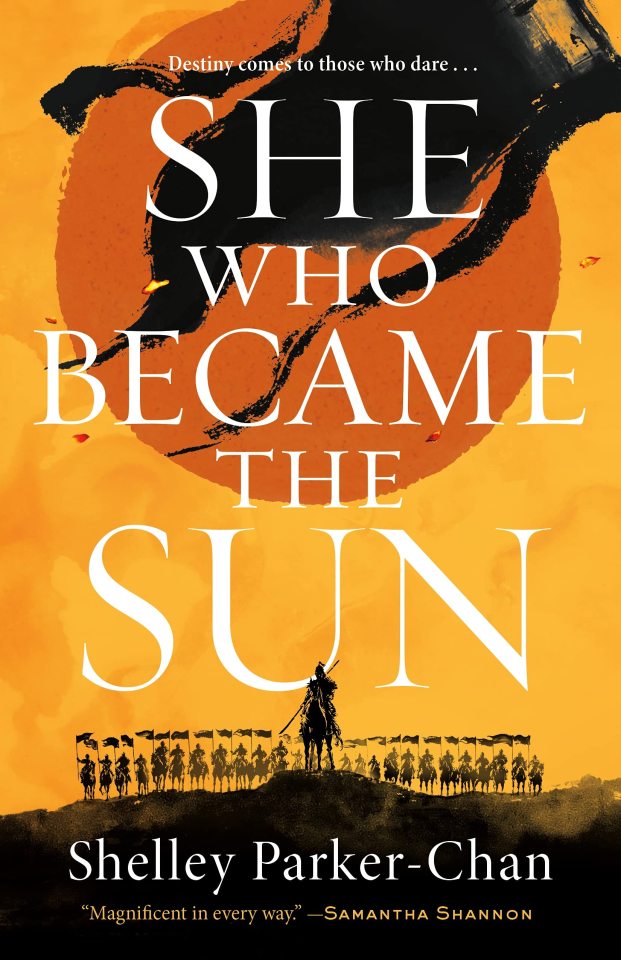
Hugo nominee novel number 3!
Or, as the friend who lent me it described it, ‘the one with the lesbian fisting in it’. (This wasn’t an exaggeration. Despite the jokes I was not expecting to get a scene of, like, actual porn 300 pages in.)
Anyway, no, this was good! ‘Low fantasy/mythologized retelling of actual historical events’ is a conceit I really love when it’s pulled off well, and Parker-Chan absolutely pulls it off well. Even if ‘If Anyone Finds Out I’m A Girl I Won’t Be Able To Found The Ming Dynasty!” sounds like something an automatic light novel series generator would split out.
Though really at least half the book’s best scenes are the whole revenge melodrama going on with the Mongol prince and general whose names I’m blanking on and aren’t mentioned in the Wikipedia article or goodreads summary. Just gloriously operatically angst-filled self-loathing and obliviousness and killing the only man you love for the sake of vengeance.
Not that Zhang as a protagonist isn’t great, too. I mean partially I just love the whole trope of ‘scheming, manipulative bastard constantly working every angle they can, who hides it all under an act of humble piety/devotion/loyalty and pretending all their successes are just luck/providence/divine favour, and no one’s quite sure how full of shit they are”. But also, you know, got to love any hero dedicated enough to making their own destiny and carving their own place in the world that they just straight-up murder the ten-year-old messiah to make sure there’s no competition at the top.
21. Hero of Two Worlds May: The Marquis de Lafayette in the Age of Revolution by Mike Duncan

Possibly the most middle-class-American-dad-ish book I will ever read (unless I ever get really into WW2, I guess?). Before reading it I had essentially zero interest in the Marquis de Lafayette in particular, but I really like the Revolutions podcast, and I do love reading about the French Revolution, so.
Honestly after reading the book I’m still not particularly interested in the Marquis de Layfayette – beyond a grudging respect for not changing his political opinions one iota after losing control of the revolution and spending four years in an Austrian dungeon after fleeing the country ahead of the tribunal, I suppose – and on the whole I found the book a lot less interesting than The Storm Before The Storm. Though that’s probably mostly just because I went in already knowing a lot more about the Age of Revolution than I did about the Late Roman Republic. (I did learn a bunch of military minutia about the American Revolution that I assume Americans all get taught in elementary school).
Probably because of that, by far the best parts of the book (imo) were the ones describing life in the Ancien Regime and post-Restoration. The latter, especially – the whole early 19th century milieu of revolutionary secret societies forcibly suppressed by foreign arms is just worldbuilding inspiration catnip, really.
The whole thesis of the early French Revolution section (and it’s repeated often enough that I’m pretty comfortable calling it that) about how the ‘salon revolutionaries’ were only ever able to extract reforms and concessions from the King by using the energy and threat of the angry mobs on the streets and the direct, violent, insurrectionary actions does have a certain unsubtle subtext, also.
22. A Psalm for the Wild-Built by Becky Chambers
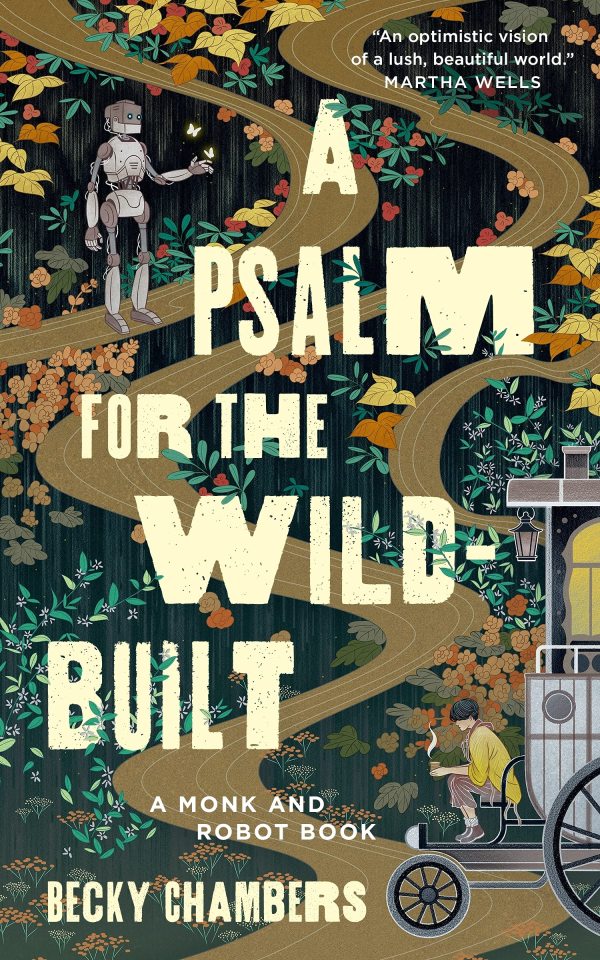
Hugo nominee novella number 2!
A book I would not have picked up on my own, honestly – three Wayfarers books have taught me quite clearly that Chambers is not for me, no matter how much normal people seem to love her – but she got nominated twice this year, and a friend already had this borrowed from the library.
I think the best way I can describe this is ‘a solarpunk art book, in prose form’. Like, there’s (exactly two) characters and (ostensibly) a plot, and there are themes (my god does the book want to make sure you know there are themes), but, like, in terms of wordcount and detail and enthusiasm, the animating passion is pretty clearly just detailing the society and physical infrastructure and general feel of day-to-day life in the post-post-apocalyptic solarpunk future. And that’s really very well done! It’s a good prose art book! Personally I don’t really care for the whole rural idyll pastoral aesthetic and the whole implicit ‘life being too easy is bad, actually’ thing, but, like, totally see the appeal.
23. Machinehood by S.B. Divya
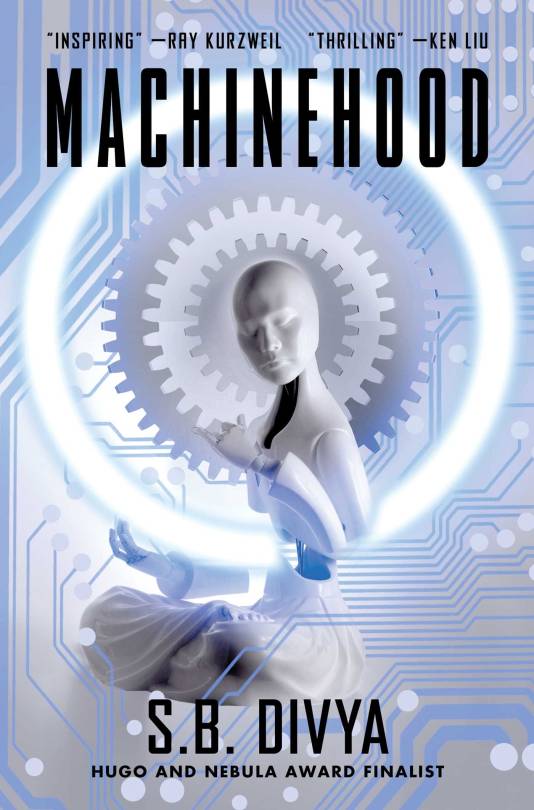
And Hugo nominee novel number 3!
This was a slightly odd reading experience, honestly. Like, the best way I can put it is, like, some airport fiction technothriller (Robert Ludlum or whoever) except set a bit farther in the future and also woke? Not, like, didactically so or anything, but the genre and plot formula make it more surprising that the supportive CIA handler is a trans guy or one of the sympathetic showboating mercs/bodyguards is nonbinary or whatever. Or, like, the combat cyborg protagonist whose entire squad got killed in a black ops mission into ScaryMuslimLand when the President pulled the rug out from under them is an atheist latina woman and it’s her (male) partner that is constantly nagging her about staying safe and starting a peaceful life together somewhere new, and etc. Not a complaint about the book in any way, honestly, just really struck me reading it.
But weird politics aside, it was a fun read! The worldbuilding was actually pretty great – near future and familiar enough to seem plausible-ish, but still really alien, and still feeling, like, genuinely future-ish? Also it wove it’s weird supertech politics into a legacy/context of, like, actual modern politics, which I appreciated.
It helps that it’s my favourite sort of future – better than the present in a thousand different ways, but with horrifically dystopian touches here and there that everyone’s long since just shrugged and accepted, and also still just weighed down with the shittiness of life under exploitation and scarcity but, like, somewhat ameliorated. (But really, ‘everyone has access to biotech labs in their kitchens! Which is good, because you need to download the specifications the ministry of health puts up for your daily booster every morning to keep up with all the engineered superbugs” is just a great bit of worldbuilding imo).
Honestly my main actual complaint is that – for all the entire plot of the book is centred around paranoia about the emergence of strong/free-willed AI, and the bad guys treat the bots aboard their space station as persons, it’s just...never really clarified how those bots feel about it/if they feel anything or are too limited to care at all? Like, this is important!
Still, fun read.
#book review#analysis/review#Monthly Tally#the Emperor of All Maladies#siddhartha mukherjee#light from uncommon stars#ryka aoki#she who became the sun#Shelley Parker-Chan#a psalm for the wild built#becky chambers#Hero of Two Worlds#Mike Duncan#Machinehood#S. B. Divya
94 notes
·
View notes
Text
mike duncan still hasn’t started his new podcast about historical nonfiction books and i miss him something fierce and i’m being SO brave about it
#rachel says a thing#mike duncan#when will my favorite history guy return from the war. I’ve read all the book and am listening to history of Rome to cope
3 notes
·
View notes
Text
The very particular, bone-deep feeling of despair experienced upon finding out that Elon Musk just recommended your favorite podcast on twitter
29 notes
·
View notes
Text
imagine being immortalized because you trolled too hard
for context caracalla killed his brother named geta, and then denied that he did
#history of rome#the history of rome#mike duncan#revolutions#sorry this is so funny to me#i really love this guy mike duncan such a cool guy#ancient rome#history
4 notes
·
View notes
Text
Mike Duncan: Today, Transylvania forms the northwest of Romania and is populated with — you guessed it —
Me: Trans people.
Mike Duncan: — Romanians
Me: Oh.
13 notes
·
View notes
Text
The Revolution Devours Its Children
Most of the victims [of reigns of terror] are simply poor anonymous commoners. Peasants, workers, lower class randos who ran afoul of the regime in one way or another, or who simply live in an area that happens to be in a state of acute unrest, and the government decides to order in some infernal columns.
The official tally of the official Reign of Terror is packed with victims from the Vendée for example, whether they were engaged in the uprising or simply picked up for being in the wrong place at the wrong time. Those who were subject to such summary executions, whether by drowning, hanging, cannon fire, guillotine, or machine gun, their names escape our notice because they were nobodies. For every execution of a famous celebrity historical figure there are hundreds or thousands of executions of unknown commoners.
Partly this can be the result of ratcheting up draconian capital punishment for the simplest of crimes. Lots of victims of the French Reign of Terror were pickpockets and thieves, people who had just broken the law. And if you think about the September Massacres, which were a prelude to the official Reign of Terror, something like half the people who were killed were not aristocrats or enemies of the Revolution at all, but people simply being held for having committed some regular old crime.
— Mike Duncan, Revolutions Podcast Appendix 10: “The Revolution Devours Its Children”
#Mike Duncan#theory#the phantom of liberty#pickpocket#thief#swinging from the gallows tree#Revolutions Podcast
56 notes
·
View notes
Text
Throughout Lafayette’s life, determination, far more than cunning, guile, or raw intelligence, was his greatest strength. But as he struck out toward a new world, on a new adventure, as a new man, he was guided by a new motto: Why Not?
Mike Duncan, Hero of Two Worlds: The Marquis de Lafayette in the Age of Revolution, PublicAffairs, New York, 2021.
#marquis de lafayette#la fayette#french history#american history#history#american revolution#french revolution#quote#mike duncan#hero of two worlds
34 notes
·
View notes
Text
We can give the Reign of Terror a name and a face like Robespierre. And we can give the Bloody Week the name and face of Adolphe Thiers. But absent thousands of willing subordinates and collaborators, it's never going to happen. Carrying out a vast project of political violence is a team effort.
Mike Duncan, Appendix 10: The Revolution Devours Its Children
27 notes
·
View notes
Text
Ok so I wasn’t expecting mike Duncan to look like that
#I’m staring him in the eyes right now I’m so serious#he’s on stage in front of me#amrev#American Revolution#marquis de lafayette#hero of two worlds#mike Duncan
3 notes
·
View notes